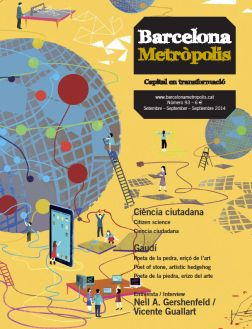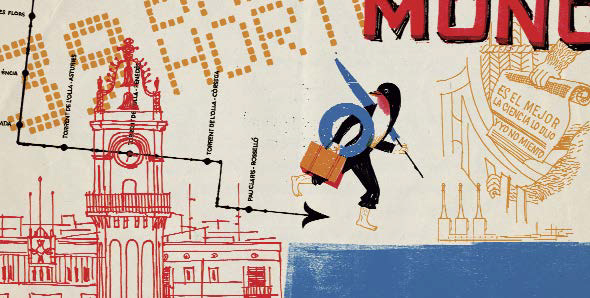In February, Joan Carreras was awarded the City of Barcelona Award in Catalan Literature for Cafè Barcelona, a novel about a native who has exiled himself in Holland and returns to observe his city and neighbourhood from a distance. Carreras uses his protagonist as a vehicle for expressing his vision of today’s Gràcia district.
The protagonist of Cafè Barcelona returns to his city following an absence of many years, and immediately finds that “Gràcia has also changed”. His first surprise comes whilst exiting Fontana metro station when he sees that Carrer d’Astúries had been turned into a pedestrian street.
He is right. The neighbourhood has changed. The city has changed. The Carrer d’Astúries I knew was no better than the one that is there now. Nor are the streets I walked with friends and family better than the actual streets where today’s Gràcia residents live.
Still, the changes have a saddening effect on us until we understand them. To overcome this melancholy, we amuse ourselves with the belief that we come from a unique place, different from all the rest, the best.
Those of us who hail from Gràcia have always known that when we say we are from the best neighbourhood in Barcelona, we do so not out of arrogance but out of conviction, even if it’s an arrogant conviction.
We do not base these ideas on reason, or even feelings. Reason would tell us that no neighbourhood is the best, because the term is as empty as a faded memory. Our feelings would confuse the nature of our belief, which is placid, almost unconscious – I said almost – and nearly impossible to cure. The idea that supports this ridiculous vice – which those of us from Gràcia feel compelled to repeat like a parrot – is not imitated, but learned. It is not taught, but inoculated.
I was born in Gràcia, in a hospital that no longer exists. I lived in Gràcia for so many years that all the years began to seem one and the same. Until they no longer were.
And now that I live in one of Barcelona’s best neighbourhoods – I seem to have fallen into the trap once again – I still have the idea that I am from Gràcia and always will be. I’m from a neighbourhood where we had to catch the No. 39 bus to go to the beach.
It is when you grow up – it is then, yes; it’s always been that way – that you assimilate the conviction and call it “undisputed fact”, until the day comes when you no longer need to think. You are not even convinced. You just know: Gràcia is the best neighbourhood in Barcelona.
It doesn’t matter that there are still cobbled streets, or that parking bollards have been put up. As long as the idea still remains, Gràcia will not change. Because Gràcia is a twisted idea: the natural assumption that some places are better than others, and that one is better than all the rest. Self-injected with a syringe.
You should understand us. We need this idea. We would miss it so much. Especially after having moved away from Gràcia. Because we have nothing left but vague memories of streets that are no longer as they once were, and the only thing that can save us from the desolation of that is this twisted idea.
This distortion is the constant in a neighbourhood that has only changed because we have grown older, believe it or not. That was easy to understand.
I don’t have to think about it. I don’t need to convince myself. Now I know.
That’s why I’ve decided to die in Gràcia.
This morning. At eight o’clock on the dot.
I’m planning to rise from the dead half an hour later, near the beach, in one of Barcelona’s best neighbourhoods. Its inhabitants call it Badalona. Many there have injected themselves with the same sense of pride that Gràcia residents have. Such similarities could be a source of conflict, but they have the advantage of living a stone’s throw from the sea. And that’s better than catching the No. 39 bus.




